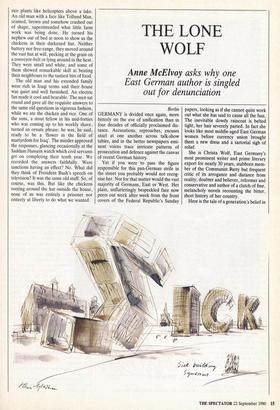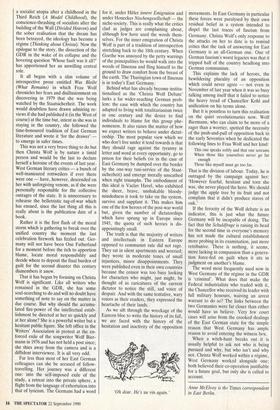THE LONE WOLF
Anne McElvoy asks why one
East German author is singled out for denunciation
Berlin GERMANY is divided once again, more bitterly on the eve of unification than in four decades of officially proclaimed dis- tance. Accusations, reproaches, excuses snarl at one another across talk-show tables, and in the better newspapers emi- nent voices trace intricate patterns of prosecution and defence against the canvas of recent German history.
Yet if you were to pass the figure responsible for this pan-German strife in the street you probably would not recog- nise her. Nor for that matter would the vast majority of Germans, East or West. Her plain, unflatteringly bespeckled face now peers out week after week from the front covers of the Federal Republic's Sunday papers, looking as if she cannot quite work out what she has said to cause all the fuss. The inevitable dowdy raincoat is belted tight, her hair severely parted. In fact she looks like most middle-aged East German women before currency union brought them a new dress and a sartorial sigh of relief.
She is Christa Wolf, East Germany's most prominent writer and prime literary export for nearly 30 years, stubborn mem- ber of the Communist Party but frequent critic of its arrogance and distance from reality; doubter and believer, reformer and conservative and author of a clutch of fine, melancholy novels recounting the bitter, short history of her country.
Here is the tale of a generation's belief in a socialist utopia after a childhood in the Third Reich (A Model Childhood), the conscience-thrashing of socialists after the building of the Wall (Divided Heaven) and the sober realisation that the dream has been betrayed, the ideology has become a regime (Thinking about Christa). Now the epilogue to the story, the dissection of the GDR in the wake of its collapse and the hovering question 'Whose fault was it all?' has apportioned her an unwilling central role.
It all began with a slim volume of introspective prose entitled Was Bleibt (What Remains) in which Frau Wolf chronicles her fears and disillusionment on discovering in 1979 that she was being watched by the Staatsicherheit. The work would doubtless have drawn admiring re- views if she had published it (in the West of course) at the time but, intent as she was in staying in the country, she followed the time-honoured tradition of East German literature and wrote it 'for the drawer' — to emerge in safer times.
This was not a very brave thing to do but then Christa Wolf is by nature a timid person and would be the last to declare herself a heroine of the events of last year. West German literary critics — a bunch of well-manicured rottweilers if ever there were one — have, however, descended on her with unforgiving venom, as if she were personally responsible for the collective outrages of the state. It is unnecessary to rehearse the belletristic tug-of-war which has ensued, since the last thing all this is really about is the publication date of a book.
Rather it is the first flash of the moral storm which is gathering to break over the unified country the moment the last celebration firework has fizzled out. Ger- many will not have been One Fatherland for a moment before the itch to apportion blame, locate moral responsibility and decide where to deposit the final burden of guilt for the second disaster this century dismembers it anew.
That it has begun by focusing on Christa Wolf is significant. Like all writers who remained in the GDR, she has some soul-searching to do and will no doubt have something of note to say on the matter in due course. But why should the accumu- lated fire-power of the intellectual estab- lishment be directed at her so quickly and at her alone? She is a powerful writer but a hesitant public figure. She left office in the Writers' Association in protest at the en- forced exile of the songwriter Wolf Bier- mann in 1976 and has not held a post since; she shies away from the camera and is a diffident interviewee. It is all very odd.
Far less than most of her East German colleagues can she be accused of fellow- travelling. Her journey was a different one: into the self-imposed exile of the study, a retreat into the private sphere, a flight from the language of exhortation into that of lyricism. The Germans had a word for it, under Hitler innere Emigration and under Honecker Nischengesellschaft — the niche-society. This is really what the critics clad as judges are complaining about, although few have used the words them- selves. For the inner emigration of Christa Wolf is part of a tradition of introspection stretching back to the 18th century. When Goethe was annoyed by the petty warrings of the principalities he would walk into the woods of Ilmenau and fling himself to the ground to draw comfort from the breast of the earth. The Thuringian town of Ilmenau is in today's East Germany.
Behind what has already become institu- tionalised as the `Christa Wolf Debate' lurks a far wider-reaching German prob- lem; the ease with which the country has adapted to living with totalitarianism twice in one century and the desire to find individuals to blame for this group phe- nomenon. It also raises the matter of how we expect writers to behave under dictat- orship. The most popular view which we who don't live under it tend towards is that they should rage against the tyranny in letter and word at every opportunity, go to prison for their beliefs (or in the case of East Germany be dumped over the border by the one-way taxi-service of the Staat- sicherheit) and emerge morally unscathed when right triumphs. The embodiment of this ideal is Vaclav Havel, who exhibited the sheer, brave, unshakable bloody- mindedness it took to take on the system, survive and supplant it. This makes him one of the few heroes of the post-war world but, given the number of dictatorships which have sprung up in Europe since 1945, the quota of such heroes is dis- appointingly small.
The truth is that the majority of writers and intellectuals in Eastern Europe opposed to communist rule did not rage. They sat in silent apartments and worried; they wrote in moderate tones of small injustices, minor disappointments. They were published even in their own countries because the censor was too busy looking for characters who might, just might, be thought of as caricatures of the current dictator to notice the still, sad voice of despair. And with the same tentative, wary voices as their readers, they expressed the heartache of their lands.
As we sift through the wreckage of the Eastern bloc to write the history of its fall, we are faced with the history of the hesitation and inactivity of the opposition 'Oh dear. He's au vin again.' movements. In East Germany in particular these forces were paralysed by their own residual belief in a system intended to dispel the last traces of fascism from Germany. Christa Wolf's only response to the attacks on her to date is to remind critics that the task of answering for East Germany is an all-German one. One of German fascism's worst legacies was that it tripped half of the country headlong into German communism.
This explains the lack of heroes, the bewildering plurality of an opposition which could never agree — not even in November of last year when it was so busy talking among itself that it failed to notice the heavy tread of Chancellor Kohl and unification on his terms alone.
But it is pointless to turn this realisation on the quiet revolutionaries now. Wolf Biermann, who can claim to be more of a rager than a worrier, spotted the necessity of the push-and-pull of opposition back in the early Seventies when he dedicated the following lines to Frau Wolf and her kind: This one speaks softly and that one screams When those like yourselves never go far enough
Those like myself must go too far.
That is the division of labour. Today, he is outraged by the campaign against her: 'However fearful, hesitant and torn she was, she never played the hero. We should judge the apple tree by its fruit and not complain that it didn't produce staves of oak.'
If the ferocity of the Wolf debate is an indicator, this is just what the future Germany will be incapable of doing. The fact that the Schuldfrage is raising its head for the second time in everyone's memory has not made the cultural establishment more probing in its examination, just more retributive. There is nothing, it seems, more lacking in compassion than a genera- tion force-fed on guilt when it sits in judgment on another's blame.
The word most frequently used now in West Germany of the regime in the GDR is 'criminal'. What does that make the Federal industrialists who traded with it, the Chancellor who received its leader with full military honours, waiving an arrest warrant to do so? The links between the two Germanies were far closer than either would have us believe. Very few court cases will arise from the crooked dealings of the East German state for the simple reason that West Germany has ample reason to avoid entering the witness tx-vx.
When a witch-hunt breaks out it is usually helpful to ask not who is being pursued and why, but who isn't and why not. Christa Wolf worked within a regime, West Germany worked alongside one;
both believed their co-operation justifiable for a future goal, but only she is called to account.
Anne McElvoy is the Times correspondent in East Berlin.



































































 Previous page
Previous page